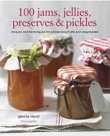
This is such a great time of year to go out foraging. I’m getting so used to collecting my ingredients for free, I can hardly imagine buying any from now on. As well as berries and fruits gathered from the hedgerows when out walking, the house is full of an abundance of other free stuff people have given me that requires attention; apples, pears, grapes, green tomatoes, cucumbers, quinces, all set to become jams, pickles, jellies and fruit butters. It is sometimes quite a facing to deal with it all but the opportunity to stock the pantry is just to good to pass up, so I feel compelled to endeavour to work my way through all these luscious ingredients before they disappear for another year.
It is amazing how much produce is out there going begging and often people with a plentiful supply of fruit have neither the time or inclination to do anything with it so are all too happy to give it away to someone who will make use of it. The more you let it be known that you are there to take these ingredients off others hands, the more stuff seems to turn up. Hence my kitchen smells of apples and quinces and I don’t have an empty basket or colander in the place.
Cordials and syrups are perfect comestibles to make yourself and this is when canning makes such sense. Whilst jams and pickles often have enough acidity, sugar and cooking time to ensure they’ve a good chance of staying safe enough to eat for months on end without water processing them (at least by European standards anyway), cordials must be either frozen or canned to help them keep for longer than a few weeks in the fridge. Smart delis and farm shops sell all sorts of cordials but they are really easy to make yourself. It is the pasturisation part that is the big mystery for most people.

Rosehip syrup is an old traditional recipe, known for being high in vitamin C, so therefore particularly good for you. It does of course contain sugar and is cooked for a while which must surely reduce the amount of vitamin C, but hey, it tastes really good. According to Wild Food by Roger Phillips, rose hips contain four times as much vitamin C as blackcurrant juice and twenty times as much as oranges, so even with a reduction from processing they appear to be stuffed full of goodness. It isn’t always so easy to find a plentiful supply of rosehips all in one go, in which case gather them whenever you see them and keep them in a container in the freezer until you have accrued enough. It is said that rosehips are best after a frost anyway but I find they’ve usually gone over by then so best not take the chance and miss them altogether. Making them into cordial thankfully helps avoid the fiddly and arduous job of removing the seeds from each hip, one by one, as they all come out in the jelly bag. The seeds are what impish schoolboys once used as itching powder in the good old days. I wouldn’t want them down the back of my liberty bodice.
HOW TO MAKE ROSEHIP SYRUP
Makes 1.5ltrs ( 2 1/2 pints)
1Kg (2 lbs) rosehips
2.5ltrs (4 1/2pts) water
450g (1lb) sugar
Wash and drain the rosehips and remove stems and stalks with scissors. Blitz them in a food processor, or put through a mincer, to help smash them up. Put half the water in a pan and bring to the boil, then add the rosehips bring back to the boil and remove from the heat. Leave to macerate for 20 minutes.
Pour into a jelly bag suspended over a bowl to collect the drips and leave for an hour or so. Boil the remaining water and add the pulp from the jelly bag, bringing back to the boil and removing from the heat exactly as before. Leave to macerate for 20 minutes then pour into the jelly bag, collecting the liquid that drains through and adding it to the first amount collected.
Prepare the water bath, jars and seals or bottles ready for canning. For more info about how to hot water process, refer to the guide here.
Pour the combined juice into a pan and boil it until reduced to approximately 900ml (1 1/2 pints). Add the sugar and stir over a low heat until dissolved. Turn up the heat and boil for 5 minutes. Pour into sterilised bottles, seal and process for 5 minutes. Leave till cold before testing the seals, label and store.






